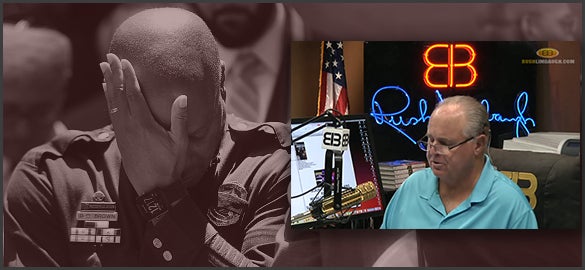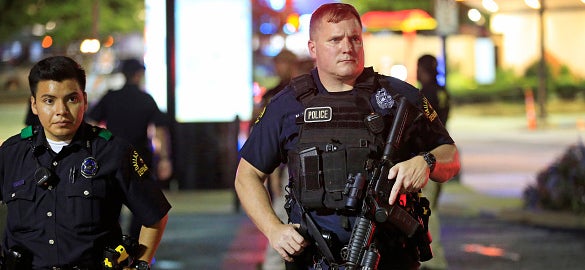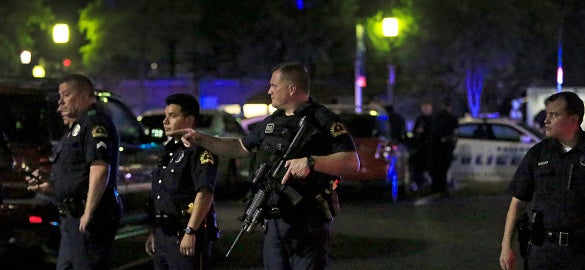CALLER: How are you doing, Mr. Limbaugh?
RUSH: Very well, sir. I’m glad you called.
CALLER: This is my first time calling in to you, but I listen to you all the time. I just wanted to call and say thank you for putting perspective on what we go through out here. Your first guest, bright lady. I wish more people would listen. I appreciate your effort.
RUSH: Are you a police officer?
CALLER: Yes, I am. I’m on duty right now. I had to turn my radio down.
RUSH: Really, outside Dallas?
CALLER: I’m sorry?
 RUSH: You’re outside Dallas on duty. I can’t imagine. I’ve tried to, ever since I learned of this last night, Seth, I mean there were cops that answered the call last night knowing full well what was going on. I can’t imagine what goes through your head now putting on the uniform every day.
RUSH: You’re outside Dallas on duty. I can’t imagine. I’ve tried to, ever since I learned of this last night, Seth, I mean there were cops that answered the call last night knowing full well what was going on. I can’t imagine what goes through your head now putting on the uniform every day.
CALLER: We just gotta do it. That’s what we get paid for. And some of it, like I was telling Mr. Snerdley, there’s just so much more that goes into it that people don’t realize. Last night, absolutely horrible, but other people don’t hear about the other things that we deal with: a drowning 5-year-old, a 90-year-old that dies in a car wreck right in front of you. That kind of stuff doesn’t make national news, but it affects everybody. You know what I mean?
RUSH: Yes, in my own much smaller way than yours I know exactly what you’re talking about. You do your job every day. When things go right, there’s never any coverage. But when certain things happen, boy, the world descends on you and they plug you into a narrative that has been established that you’re either a pig, you’re a racist, you’re a hater, and that’s why you joined the cops and so forth. I know exactly. The good work you do — it’s kind of like the CIA, every success nobody can ever know. You guys, not that your work is clandestine, but it’s not news when you save a kid. It’s not news when you help somebody who is having a heart attack or somebody that’s had an automobile accident, you’re the first on the scene, you save a life. It doesn’t make the news. It just doesn’t.
CALLER: I just wanted to call and say thank you, Rush, for everything that you do for us, brother.
RUSH: Well, we’re all with you. We’re all with you. Appreciate it, Seth. Seth, while I’ve got you, let me ask you something else. Because I mentioned this also to Ms. Mac Donald yesterday in the interview I did for the newsletter, because it’s all part of the mix, I think.
I just want to get your opinion. I don’t know if you saw them or not. But this spring there were two different miniseries, documentaries on the O.J. Simpson case. And both of them, one of them particularly, set the whole thing up by rebroadcasting a history of police racism, LAPD against African-Americans in the community, and they set it up that way to explain why the jury found O.J. not guilty.
Now, you’re an American. You watch television. I don’t know if you saw these, but imagine you were. You’re watching a miniseries on the O.J. trial. All of a sudden you see five straight nights in a row of how the LAPD is a bunch of racist pigs that are killing and injuring and maiming innocent African-Americans, and you’ve got to go to work the next day knowing a lot of people where you work saw the same thing. Do you think about that? Does that affect you as you do your job?
 CALLER: Oh, good grief, I would be lying if I say it doesn’t. And over the years, I’ve been doing this 18 years, and you compartmentalize things like that. But when things like last night happened, it finally comes bulging out and here I am talking to Rush Limbaugh. And it’s a way to vent sometimes. Does that make sense?
CALLER: Oh, good grief, I would be lying if I say it doesn’t. And over the years, I’ve been doing this 18 years, and you compartmentalize things like that. But when things like last night happened, it finally comes bulging out and here I am talking to Rush Limbaugh. And it’s a way to vent sometimes. Does that make sense?
RUSH: Totally. Yeah. Totally. All right. I guess it’s my way of expressing how I empathize with what you do. I watched those and I got mad all over again. It didn’t even affect me and I got mad all over again. I can imagine what happened to other people who might have claimed more relevance to it than I did. I just watched it as another citizen once again from afar, even though the program is on the air in Los Angeles. We talked about it each and every day. It got to the point, we didn’t know O.J. (unintelligible).
But those kinds of things are incendiary. No, no, I’m not saying don’t broadcast them. I’m just saying those things are like lighting firecrackers, like lighting fireworks go off again, especially events that, like the Rodney King beating. I must have seen it two nights in a row with every second of video footage, what a bunch of racist cops they were, how the cops got off. The conclusion was that the cops are always going to get the benefit of the doubt. They’re always guilty but they are always found not guilty and so forth.
And I’m saying you just can’t have all this stuff on television all the time and have it not create anger with people. And these are events that are long ago over and dealt with that people want closure on. And they reopen the old wounds. It circles back to my whole premise of who benefits or who tries to benefit from this. Seth, thanks for the call. He’s an on-duty police officer right now outside Dallas.
BREAK TRANSCRIPT
RUSH: Here is Glenn in Cincinnati on Open Line Friday. Great to have is you on the program, sir. Hello.
CALLER: Hello, how are you?
RUSH: Good, very good. Thank you.
CALLER: So I’ve got a good question for you.
RUSH: All right.
 CALLER: Elijah Cummings. He operated a sit-in on gun control. What if it would have worked and it would have passed, and we would have had people put on no fly lists, and the first people put on that no fly list would have been people who are members of the Black Lives Matter movement?
CALLER: Elijah Cummings. He operated a sit-in on gun control. What if it would have worked and it would have passed, and we would have had people put on no fly lists, and the first people put on that no fly list would have been people who are members of the Black Lives Matter movement?
RUSH: Wait a minute. How do you know that? (chuckles) How do you know they wouldn’t have been granted an exemption?
CALLER: Well, that’s my point. So you don’t think Obama would have supported members of Black Lives Matter being put on the No Fly List? They’re terrorists. They’re doing terrorist activities.
RUSH: Now which comes first? Getting on the No Fly List means you can’t get a gun or you can’t get a gun puts you on the No Fly List? Which comes first?
CALLER: Well, I think the bill would have been: If you’re put on the list, you can’t get a gun.
RUSH: But isn’t that the case now? Or no? That’s right. That’s what they want to make it — and, of course, the reason that’s bogus is because there’s all kinds of people on the No Fly List who have no business being there.
CALLER: Absolutely.
RUSH: So you can automatically… You can assign somebody to the No Fly List by virtue of that deny them a gun. If BLM people ended up there, would Elijah Cummings…? That’s a good question. If you came up with something that would take guns out of the hands of these guys… (laughing) Wow.
CALLER: (laughing) Absolutely. It’s a little ironic.
RUSH: It would be an interesting way to expose the truth from some of these people, wouldn’t it?
CALLER: Absolutely. And, you know, if they really thought about socialism and communism has killed more people than guns ever have. So they oughta stop being socialists. (chuckling)
RUSH: Well, but that’s just to make sure that some people don’t do better than others. If you can’t bring them down economically you kill them, that’s how you promote equality. You build a wall to keep them in the country. Socialism, communism, build walls to make sure people can’t get out. In a country that’s communist and builds a wall, there’s nobody trying to get in. Works every time it’s tried. Thanks for the call, Glenn. This is Max, in Boston. You’re next. Open Line Friday. Hi.
CALLER: Rush, it’s an honor and privilege. I’ll get to my point. So every time that we have a terrorist attack on Islamists, this president comes out and preaches to us that this is a minority; there should be no black lash towards other Muslims. They won’t accept it or tolerate it, and they will prosecute.
 RUSH: This is an excellent point. I know where you’re going with this.
RUSH: This is an excellent point. I know where you’re going with this.
CALLER: Now, anytime that there’s a cop that shoots a black man — and whether it’s a justified shooting or not. In the tragic case in Charleston where they murdered him by shooting him in the back… He doesn’t come out and stick up for them. He doesn’t come out and say, “Look, this wasn’t a cop. This was a murderer on that day, and 99.9999% of police are great Americans that put their lives on the line for us each and every day and we will not tolerate or accept any backlash.”
RUSH: It’s a good… To be consistent… Let me put this in my own inimitable style. It’s a great point out there, Max. To be consistent… Every time a militant Islamist terrorist shoots somebody up, what does Obama do and the Democrats? They come out and they demand that there be no backlash against Muslims. Okay. So any time a police officer shoots a black suspect — without knowing why, without knowing the circumstances — why doesn’t Obama stand up and warn against a backlash against cops? If we are to guard against backlash against Muslim shooters, where is the sameness? Where is the equality, fairness, what have you? It’s a good point. I don’t think I’ve ever heard anybody in this Regime counsel restraint and advise, “No backlash against cops. We must maintain the order.”
BREAK TRANSCRIPT
RUSH: Jim in Bluegrass, Iowa, you’re next great to have you on the program. Hi.
CALLER: Mega dittos, Rush, from the state of the Hawkeye caucus. I’m a retired police officer. I spent 30 years working for a fairly good-sized municipality. I’ve worked with minority officers both as partners and as a supervisor. In our department and most of the departments I used to work with, were very much looking to hire minority officers. They recruit and they did an excellent job. It’s a very difficult thing because it just seems like a lot of them don’t want to go in and do the job. Saying that, all minority officers, all the officers that I’ve worked with have been excellent, excellent people. But I’ve seen on calls where they take more abuse from the minority community than white officers do.
 RUSH: You mean because they’re like sell-outs?
RUSH: You mean because they’re like sell-outs?
CALLER: Right. Exactly. Exactly. That would probably be the best way to describe. I’ve seen it happen firsthand. And it’s a difficult job to begin with. My heart and prayers go out to my brother officers and sister officers out there.
RUSH: You know, there was another cop shooting today in Ballwin, Missouri, outside St. Louis. The police officer, in a confrontation with a motorist, the motorist opened fire. The police officer just died, by the way. The suspect is in custody.
CALLER: Oh my. We had a similar incident to Ferguson in our area where an officer had stopped an individual who was unarmed. It very much offends me to hear that they’re “unarmed.” And out of nowhere, this individual starts beating the officer, gets on top of him and tries to take his gun to shoot him.
RUSH: You are retired. But I’m sure it was much the same — I try to put myself in the shoes of people in the news. I’m in the news myself quite a lot. But there’s many days I give thanks I’m not in the news and the news that’s out there. But these cops are, and as more of these events happen and as the news publicizes all these, it’s got to be harrowing to put on that uniform the day after something like this happens, or a shooting in Minneapolis or Louisiana or any of these events. To go to work the next day, you have to know, you have to suspect everybody else saw the same thing, and you have to know that emotions are at a fevered pitch. It’s got to make it even more dangerous than it normally is. And I don’t think most people stop to think of it.
CALLER: No, it’s a difficult job at best. And all the excellent people who I’ve worked with over the years —
RUSH: Why did you want to do it? Why did you want to become a cop?
CALLER: Because I wanted to help people. I don’t like to see somebody who is down and out or somebody who can’t defend themselves be taken advantage of.
RUSH: So it wasn’t about getting bad guys; it was about helping people?
CALLER: Right. I’ve always wanted to assist people. You talk to my wife, you talk to the people who knew me, especially at a younger age, I always wanted to go out and help someone. It just seemed like it was the right thing to do. I like working with all aspects of the community. I spent a good chunk of my time in PR as well as working with kids in schools and trying to encourage them to be honorable people.
RUSH: When you talk about helping people, you’re talking about not only people down and out, but you’re talking about people, victims of crime.
CALLER: Oh, yes. Yes.
RUSH: How much of your desire to be a cop was based on finding people that commit crime, apprehending them, and seeing that they’re punished?
CALLER: That’s certainly an element of it. You want to get to the bottom of things.
RUSH: Because that’s the dangerous part of it today, that’s the dangerous part of it today. You’re going after, by definition, people breaking the law who don’t want to get caught.
CALLER: Right.
RUSH: You never know, somebody runs a stop sign, could have all kinds of illicit contraband in the car hoping that you don’t find it. You hope that you don’t find it, I’m sure.
 CALLER: Well, going back to the officer I was mentioning a little bit ago, it was just a suspicious person. He was just walking down the street. And there was a suspicious call. The officer responded, came up and started chatting with him. And out of nowhere this guy starts hitting him and hitting him violently and tries to take his gun. So I, fortunately, didn’t have that happen to me. But I’ve been involved in a number of situations where we were outnumbered in a very high tense situation, and you use your communication skills and calm people down and do the best you can there and you do everything you can. I mean, the last thing that any officer wants to do is pull the trigger. I’ve never, ever, with all the officers I’ve ever worked with or met, have ever heard anybody say: I just can’t wait to go out there and do that.
CALLER: Well, going back to the officer I was mentioning a little bit ago, it was just a suspicious person. He was just walking down the street. And there was a suspicious call. The officer responded, came up and started chatting with him. And out of nowhere this guy starts hitting him and hitting him violently and tries to take his gun. So I, fortunately, didn’t have that happen to me. But I’ve been involved in a number of situations where we were outnumbered in a very high tense situation, and you use your communication skills and calm people down and do the best you can there and you do everything you can. I mean, the last thing that any officer wants to do is pull the trigger. I’ve never, ever, with all the officers I’ve ever worked with or met, have ever heard anybody say: I just can’t wait to go out there and do that.
RUSH: You pull the trigger, it’s hello IAB, right?
CALLER: You bet. We used to have a cartoon in the back hallway and it was an officer pointing a gun basically at a person who was stealing. And behind him were all these different people. There was a lawyer, “You better make sure you have it right.” You have the citizen out there, “Hey, it might look bad.” I can’t remember what they all were. But the best way I heard, you have a tenth of a second to make a decision, you have 10 years to determine whether or not —
RUSH: I don’t think I could do the job. I’d be too lenient. I’d let way too many people go at traffic stops or petty this or petty that. I’d be too lenient. I’d be too nice a guy. I’d be too second chance-oriented. Cops, the law’s the law. You see somebody break it, you’ve got to be willing to enforce it. And doing that enhances the confrontational aspect of the whole circumstance. The more the confrontational aspect is ratcheted up the more danger is involved. It’s gutsy work. There’s no question. Look, I appreciate the call, Jim.



